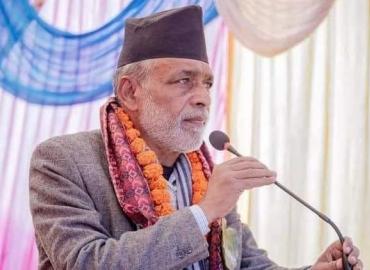Kathmandu, Dec 4: The National Human Rights Commission (NHRC) has expressed its concern over people with disabilities (PWD) facing the lack of accessibility to the service provider agencies making it tougher for them to avail services and facilities.
Unveiling the report about provisions of mental health rights in the Gandaki and Bagmati Provinces as of 2081 BS on last Tuesday, the Commission stated that although the quality of the buildings of the service provider agencies was high, those infrastructures were not disabled-friendly.
The report shows that public as well as private healthcare facilities were far from being disabled-friendly. So was the case with rehabilitation centres and other organizations, it was mentioned.
Some new buildings had lift and ramp for wheel-chairs, the PWD could not have surety of easily accessing to the restrooms, bathroom and canteens in those buildings, the report highlighted.
Furthermore, the report brought to the fore to the grave issue of PWD's rights to attending to their basic needs such as food, clean drinking water and comfortable accommodation facilities was being neglected.
Also, there is a scare of skilled human resources such as psychologists, psychiatrists, nurses and social mobilizers among others in the Bagmati and Gandaki Provinces for the PWD, the report noted.
The National Health Insurance Programme also appears to be ineffective for the people with mental health issues or psychological disabilities as their access to it was limited, it was reported.
Commission's Chairperson Tap Bahadur Magar shared that the research and study attempted to examine or identify the quality of treatment, care and support mechanism for the people with mental problems and psychological disabilities.
It is stated that widespread differences were seen from the perspective of sanitation at the organizations and rehabilitation centres visited in course of the study.
The study showed that some organizations the sanitation standard was found to be good while it was average in some others. It is stated that most of the organizations have not really paid attention on the topic of confidentiality.
The study report stated that several of the private hospitals lacked disabled-friendly toilets.
The study mentioned that people with mental issues and those with psycho-social debility had limited access to quality mental health services in Gandaki province which has dominant rural population as compared to Bagmati province.
NHRC Chairperson Magar said the study has tried to identify the quality of treatment, care and support that people with mental issues and those with psycho-social debility have.
"The study has recommended to the government and the stakeholder bodies to ensure the rights of people with psycho-social disabilities and to promote their mental health and wellbeing," he said.
Dr Krishna Poudel, Head of the Ministry of Health and Population's Policy, Planning and Monitoring Division, said that the Ministry has not been able to extend services of psychiatric doctors and specialists in remote areas including in the Sudurpaschim province.
"A lot of works have to be carried out with minimum resources. Although there are mental health wards at the Provincial hospitals, we have not been assign specialists in all the seven provinces. We are trying to appoint specialists there," he added.
NHRC urges three tiers of government to protect rights of people with disabilities
Meanwhile, the National human Rights Commission (NHRC) has urged all the three tiers of the government to give priority to the issues of people with disabilities in the policy, plans, programmes and budget.
The NHRC also urged the federal, provincial and local governments to protect and promote the rights of the disabled persons. It called attention of the three levels of government to these issues in the context of the International Day of Persons with Disabilities (IDPD) on December 3. (RSS)






















